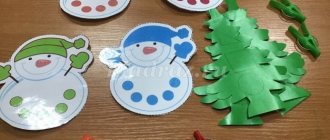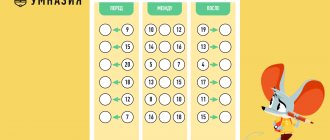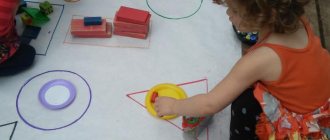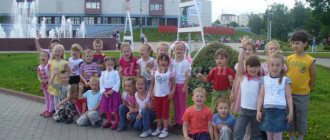MAGAZINE Preschooler.RF
Project on the mathematical development of preschool children: Formation of elementary mathematical concepts in children of the older group using entertaining mathematics(joke tasks, puzzles, intelligence tasks)
Explanatory note.
Relevance of the project.
Adults never cease to be amazed at how much a child can learn and remember in the early years. The period of preschool childhood is short relative to a person’s entire life, but how rich it is in learning! Every day brings the child something new, unknown; something previously inaccessible becomes close and understandable.
The flow of information that the surrounding life brings down on a small person is great. He finds the answer to many questions by going through trial and error, comprehending the laws: you cannot squeeze a voluminous object into a narrow hole; To make the Christmas tree garlands the same, you need to cut equal strips of paper; When treating dolls to tea, you need to put a cup in front of each one... And much, much more.
The source of a preschooler’s knowledge is sensory experience. Its range depends on how finely the child masters the sum of special actions (examining, feeling, comparing, juxtaposing, distinguishing between the main and the secondary, etc.) that influence perception and thinking.
Teaching preschoolers the basics of mathematics is currently given an important place. This is caused by a number of reasons: the beginning of schooling at the age of six, the abundance of information received by the child, increased attention to computerization, the desire to make the learning process more intensive, the desire of parents in this regard, to teach the child to recognize numbers, count, and solve problems as early as possible .
The main goal is being pursued: to raise children as people who can think, navigate well in everything that surrounds them, correctly assess the various situations they encounter in life, and make independent decisions. Adults often rush to give the child a set of ready-made knowledge and judgments, which he absorbs like a sponge. However, does this always give the expected result? For example, should a child be forced to do math if he finds it boring?
The practice of preschool education shows that the success of learning is influenced not only by the content of the material offered, but also by the form of its presentation, which can arouse the child’s interest and cognitive activity.
Entertaining can be provided by an unusual form of learning. You just need to find a middle ground: don’t complicate things—children won’t understand, and don’t simplify things by making learning easier—children will constantly look for easy ways to work less. Receiving food for his mind, the child willingly participates in activities, waits for them, and enjoys them.
Entertaining material not only captivates the child, but also helps improve the preschooler’s observation, attention, memory, thinking and speech skills. Poetic material, riddles, counting rhymes are used depending on the goals of cognitive communication. The possibilities for their use are wide: in group classes in kindergarten, during individual work with children in the family, at quizzes, leisure activities, holidays, during educational conversations, in the toy library, when children receive their parents as guests and play mathematical games with them.
Entertaining mathematics puts preschoolers in search conditions, awakens an interest in winning, therefore, children strive to be fast and resourceful.
The problem to be solved during the implementation of the project.
In the senior group of compensatory orientation there are 13 children: 7 boys and 6 girls.
During classes on the formation of elementary mathematical concepts, many children in the senior group of compensatory orientation lacked interest in mathematics and had difficulties with thinking and attention.
At the beginning of the year, this area was implemented by 1.5 points, which ultimately amounted to 37.5% - a low figure for the group.
In order to increase the level of mathematical development, the activity of children, and develop their interest in mathematics, we decided to use entertaining material: riddles, poems, didactic games, entertaining questions, joke problems, mathematical fairy tales, proverbs and sayings, finger gymnastics, labyrinths, logical endings, mathematical KVNs.
Contingent of project participants: pupils of the senior group of compensatory orientation; educator; parents of pupils.
Project goal: Formation of elementary mathematical concepts in children of senior preschool age through entertaining material.
Tasks:
- To develop interest in mathematics in children of senior preschool age, emotional responsiveness through games with mathematical content.
- Formation of basic mathematical concepts and speech skills.
- To promote the development of mental operations (analysis, synthesis, comparison, classification), logical thinking.
- Develop independence of cognition, encourage manifestations of creative initiative and resourcefulness.
- Increase your attention span and memory.
- Develop speech, the ability to express and justify your opinions;
- Cultivate interest in the subject and the learning process in general.
Contents of the project.
Stage I – preparatory.
- Involve parents in the implementation of the project.
Message: “Educational and educational tasks for the formation of elementary mathematical concepts in the senior group” at a parent meeting.
Individual conversations about diagnostic results.
- Creating conditions for project implementation.
Selection of entertaining material for individual and face-to-face lessons with children, production of gaming mathematical material.
- Primary diagnosis.
- Studying methodological literature on the topic.
- Search for materials on the Internet.
Stage II is the main one.
- Implementation of the main activities in the project areas.
- Presentation of the project is an open lesson on the formation of elementary mathematical concepts for parents.
Stage III – final.
- Carrying out final diagnostics.
- Collection and processing of methodological and practical materials.
- Correlation of predicted results with obtained ones.
- Summarizing project materials.
Expected results.
- positive dynamics of monitoring on the formation of elementary mathematical concepts in children of senior preschool age;
- formation of logical thinking operations (analysis, synthesis, comparison, classification, generalization);
- children’s use of mathematical knowledge and skills in independent activities and manifestations of creative initiative;
- parents’ awareness of the importance of forming elementary mathematical concepts in children with the help of entertaining material, expanding parents’ knowledge about entertaining material;
- developing in children an interest in mathematics and a desire to overcome difficulties.
Project implementation.
The development of attention and intelligence is facilitated by joke tasks and puzzles that warn the child against hasty and unfounded conclusions. They should not be solved like ordinary problems, using one or another arithmetic operation. These tasks should encourage children to reason, think, and find an answer using existing knowledge.
Using joke problems and intelligence tasks will help diversify and enliven activities with children. In addition, tasks of this kind can be used during mathematical leisure activities, fun meetings of preschool experts, and KVNs.
Entertaining material not only entertains children, gives them the opportunity to relax and switch gears, but also makes them think, develops independence and initiative, directs them to search for unconventional solutions, and stimulates the development of non-standard thinking.
Children are given the opportunity to listen carefully to the riddle, remember its content, and guess it. The riddle is told emotionally, slowly.
Children know a lot of counting rhymes and most often use them to choose the leader in games. The same technique can be used in mathematics classes. To increase the activity of children in the classroom, you do not need to assign children, but do it with the help of a counting rhyme.
For the formation of full-fledged mathematical concepts and for the development of cognitive interest in preschoolers, it is very important, along with other methods, to use entertaining problem situations. The fairy tale genre allows you to combine both. The plot itself and fairy-tale characters attract children. By getting used to the events of the fairy tale, the child seems to become its protagonist. At the same time, cognitive activity increases: he strives to intervene in situations and influence them. The keen interest that arises in a child can be used to increase the effectiveness of learning.
Materials for activities with children.
Game "White Sheet" .
Aimed at developing the perception of the shape of objects in children, as well as the development of fine motor skills of the hands.
Figures are drawn on a sheet of paper, some are painted in green, others are only outlined.
TASK: Cut out the figures outlined along the outline from the sheet, and then cover the green figures on another sheet of paper with them. If the shapes are positioned correctly, the result should be a white sheet of paper.
Game "Circle, Triangle, Square"
Aimed at developing the perception of color, shape and size in children.
The child is given tasks aimed at differentiating characteristics of color, size, and shape.
Game “Sew up the carpet”
Designed to develop perception in preschool children.
There were holes in the beautiful rug. There are several patches located near the mat, from which you need to choose only those that will help close the holes.
Working with materials, the child can not only choose, but also cut out the desired patch to close the hole in the carpet.
Problems-joke, puzzles, tasks for intelligence.
1. There were 10 pears growing on the pear tree, and 1 less on the birch tree. How many pears grew on the birch tree? %3
2. There were 6 carrots growing in the garden bed
And on the pine tree there is 1 more carrot.
How many carrots grew on the pine tree?
3. 8 squirrel tails were peeking out of the hollow. How many baby squirrels were sitting in the hollow?
4. The long-awaited winter has arrived. First 1 apple tree bloomed, and then 3 more. How many apple trees bloomed in winter?
(They don’t bloom in winter).
5. A hedgehog walked through the forest and found mushrooms for lunch: 2 under a birch tree, 1 near an aspen tree.
How many will there be in a wicker basket? (Answer: 3)
6. A peacock was sitting in the garden. Another one came up. Two peacocks behind the bushes. How many are there? Do the math for yourself.
(Answer: 4)
7. Come on, how many guys are there skating on the mountain? Three are sitting in a sled, One is waiting.
(Answer: 3)
8. On a large sofa, Tanin’s dolls stand in a row: Two nesting dolls, Pinocchio and a cheerful Chipolino.
Help Tanya count her toys.
(Answer: 4)
Puzzle problems with sticks.
A) From 5 sticks, fold 2 equal triangles
B) Make 2 equal squares from 7 sticks.
Puzzles.
- Seasons, months.
- Days of the week, parts of the day.
- Time watch.
- Numbers.
Counting books.
My family
1. One, two, three, four, Who lives in our apartment? Dad, mom, brother, sister, Murka the cat, two kittens,
My puppy, cricket and me - That's my whole family! One, two, three, four, five, I’ll start counting them all again
2. A jackdaw sat on the fence. The counting begins: one, two, three, four, five! I will count all the guys:
Yulia, Misha, Sveta, Kolya, Petya Ira, Vitya, Olya... If I get tired of counting, I’ll stop for a minute.
I’ll keep quiet, take a break, and start counting again.
3. We have only one red ball - This time. Two green ones, look, - This is two, and this is three.
For four, five and six - Three are blue. Let's throw yellow and pink - This is seven and this is eight.
Blue is nine, white is ten. Where should we hang the balloons? Rainbows are playing in the sky - Kids are counting the balls.
4. The sheep walked along the road and got their feet wet in a puddle. One, two, three, four, five, They began to wipe their feet:
Some with a handkerchief, some with a rag, Some with a holey mitten.
Mathematical tales.
- "Extraordinary adventures in the city of mathematical mysteries".
- “Visiting the gnome watchmaker, or a story about how not to be late for school”.
- "How Top Learned Math".
- "Zhenya's Games".
- “Help Dunno find the way”.
- "Guess yourself!".
- "How Nina taught her brother".
Photographic materials.
Results.
- Positive dynamics of growth in children's mathematical development.
At the beginning of the year, this area was implemented by 1.5 points, which ultimately amounted to 37.5% - a low figure for the group; at the end of the year – 2.3 points (57.4% average).
- Children show cognitive activity, creative initiative, and try to overcome difficulties in joint activities with the teacher and independently.
- Increasing pedagogical literacy and parents' interest in the formation of elementary mathematical concepts in children.
- An entertaining mathematics corner has been created.
- The final lesson “Mathematical Kingdom” for parents.
Literature.
- Nishcheva N.V. GAME. Games and exercises for the formation and development of elementary mathematical concepts and speech in preschoolers. - SPb.: “CHILDHOOD-PRESS” , 2003. – 16 p., ill.
- Erfeeva T.I. and others. Mathematics for preschoolers: Book. For the teacher of children. garden/T. I. Erofeeva, L.N. Pavlova, V.P. Novikova. – M.: Education, 1992. – 191 p.: ill.
- Mathematics from three to seven: Educational and methodological manual for kindergarten teachers / Author. – comp. BEHIND. Mikhailova, E.N. Ioffe; Hood. I.N. Rzhevtseva. – St. Petersburg: “Aktsident” , 1997. – 176 p.: Ill.
- Tikhomirova L.F. Development of children's cognitive abilities. A popular guide for parents and teachers. – Yaroslavl: Academy of Development, 1996. – 192 p., ill.
- L.G. Peterson, E.E. Kochemasova. Playing game. Practical mathematics course for preschoolers. Guidelines. – “Balass” , 1998. – 160 p.
| Next > |
Educational project “Entertaining mathematics”
Mathematics is one of the most difficult subjects in the school cycle, therefore, for a child to successfully study at school already in kindergarten, it is necessary to promote the mathematical development of a preschooler, expand his mathematical horizons, and improve the quality of mathematical preparation for school. This will allow children to more confidently navigate the simplest patterns of the reality around them and actively use mathematical knowledge in everyday life.
Mathematical concepts should be mastered by a preschooler consistently, evenly and systematically. For this purpose, it is necessary to organize educational activities, carried out both in the process of organizing various types of activities (game, communicative, labor, cognitive-research, productive, musical and artistic, reading fiction), and during routine moments; as well as independent activities of children using a variety of gaming tools. Also, children’s mathematical development will be more effective when interacting with children’s families.
Didactic games and game exercises using visual material (with the help of diagrams, cards, models, objects) arouse children’s interest, facilitate and speed up the memorization process, form techniques for working with memory and thinking, which in a visual and accessible form help children remember complex material .
Mathematical material is made more interesting by the game elements contained in each problem, logical exercise, and entertainment, be it checkers or the most basic puzzle. The inclusion of entertaining material in educational activities for FEMP allows children to maintain interest in the lesson, and this creates conditions for increasing the emotional attitude to the content of educational material, ensuring its accessibility and awareness. The mathematical techniques used, the combination of practical and game activities, solving problem-game and search situations contribute to the development of elementary mathematical concepts in children.
To teach preschool children to love mathematics, maintain interest in intellectual activity, and encourage them to solve search problems, it is necessary to approach the organization of the learning process creatively and with interest, to use the variety and variability of educational games with mathematical content.
Type of project : educational - gaming.
Implementation period: short-term (1 month).
Participants: group (teacher, older children, parents).
The goal of the project: the formation of elementary mathematical concepts in children of senior preschool age through entertaining material in the organized and independent activities of children.
Tasks:
- To create conditions for preschoolers to master mathematical concepts, to ensure the successful development of children’s abilities and thinking.
- To promote the development of the ability to count within 10 forwards and backwards, to correctly use ordinal and cardinal numbers.
- To help consolidate the ability to recognize and name geometric shapes.
- To help improve the ability to identify collections of objects or figures that have a common property.
- Promote the development of mental operations: logical thinking, ingenuity, visual memory, imagination, ability to compare and analyze.
- To promote the development of interest in games that require mental stress and intellectual effort.
- To promote independence, the ability to understand a learning task and carry it out independently.
- To help improve the level of readiness of older preschool children for school.
- Encourage parents to participate in the project and work with their children at home.
Expected results:
- Increasing the level of mathematical concepts in children of senior preschool age.
- Children have developed an interest in the very process of learning mathematics.
- Children independently find ways to solve cognitive problems, strive to achieve their goals, overcome difficulties, and are able to transfer learned experience to new situations.
- Activating parents' interest in the use of mathematical games and exercises.
- Parents' awareness of the importance of forming elementary mathematical concepts in children with the help of entertaining material, expanding parents' knowledge about entertaining material.
Preparatory stage:
- Determining the theme of the project.
- Setting the goals and objectives of the project.
- Selection of methodological and fiction literature on the topic of the project.
- Selection of didactic, outdoor games, physical education lessons on the topic of the project.
- Making educational games in mathematics.
- Drawing up a plan for the main stage of the project.
- Development of notes for proposed educational activities, quizzes.
- Involving parents in working together on the project:
- creative task: choose mathematical riddles, problems, puzzles and colorfully arrange this material;
- assistance from parents in making educational games based on FEMP.
- Conducting a survey of parents.
- Design of the folder - movement "Mathematics for preschoolers".
- Conversation with parents “How to organize children’s games at home using entertaining materials”
Main stage:
- GCD according to calendar and long-term planning in the senior group:
- GCD for FEMP “Letters from the Queen of Mathematics”, “City of Mathematics”;
- GCD for visual arts: drawing “Funny Figures”, pea applique “Magic Numbers”, modeling “Funny Numbers”.
- Reading mathematical fairy tales, fairy tales with elements of counting: “Three Bears”, “Two Little Bears”, “Twelve Months” by S. Marshak, “Flower - Seven Flowers” by V. Kataev; story by K. Ushinsky “Four Desires”.
- Memorizing poems about numbers, counting rhymes, riddles about geometric shapes and numbers.
- Viewing the computer presentation “Flight to the planet Mathematics”, “Funny figures”.
- Coloring math coloring pages, drawing numbers.
- Construction.
- Working with counting sticks.
- Drawing geometric shapes on semolina
- Didactic games with mathematical content: “Tic-tac-toe”, “Mathematical lotto”, “Ladybugs and daisies”, “Labyrinths”, “What numbers are lost”, “Funny numbers”, “Mathematical houses”, “Mosaic of caps”, “Tangram”, “Geometric Math Tablet”, “Magic Circles”, “Dominoes”, “Wonderful Bag”, “Ladybugs” simulator.
- Guessing riddles, entertaining questions, comic puzzles, puzzles.
- Outdoor games: “Make a figure”, “The sea is agitated”.
- Finger gymnastics.
- Physical education, “Make a figure.”
The final stage:
- An exhibition of educational games made together with children and parents.
- Conversation “What interests me about mathematical games.”
- Exhibition of little books with mathematical tasks.
- Independent activity of children in the math corner.
- Using didactic games on FEMP on GCD.
- The final event is the “Smart Men and Women” quiz.
- Processing and design of project materials.
Progress of the project.
Work on the project took place in several stages. At the preparatory stage, a plan was drawn up for the implementation of the main stage of the project, methodological and fiction literature, illustrative material, computer presentations “Flight to Planet Mathematics”, “Funny Figures”, didactic games, physical education lessons, and finger gymnastics were selected. Educational games with mathematical content were produced.
Parents were involved in preparing the implementation of the project: a survey was conducted with them, and a folder was prepared for them - the “Mathematics for Preschoolers” folder. Parents also provided assistance in making educational games in mathematics. Parents were given the task: to select entertaining mathematical material (problems, riddles, puzzles, puzzles) and arrange it colorfully.
At the main stage of the project, many activities were related to the theme of the project. During classes on speech development and reading fiction, my children and I:
- read mathematical stories and fairy tales with mathematical content: “Three Bears”, “Two Little Bears”, “Twelve Months” by S. Marshak, “Flower - Seven Flowers” by V. Kataev; story by K. Ushinsky “Four Desires”;
- memorized poems about numbers, counting rhymes, and mathematical riddles.
During art classes, children created drawings using geometric shapes and made “magic” numbers from peas and plasticine.
During mathematics classes and during free activities, children worked with mathematical copybooks - coloring books, and made buildings from construction sets, mosaics, and Gyenish blocks. The children also worked with counting sticks: they assembled figures according to the pattern and design. The kids really enjoyed drawing geometric shapes on semolina.
We played a lot of homemade didactic games with mathematical content:
- "Tic Tac Toe." Objectives: to promote the development of attention, memory, the ability to focus on a specific subject for a long time, to promote the development of the ability to distinguish between concepts such as “diagonally”, “vertically”, “horizontally”.
- "Mathematical Lotto" Objectives: to promote the assimilation of the order of numbers from 1 to 9; consolidation of knowledge about geometric shapes.
- "Ladybugs and daisies." Goal: developing the ability to compare, contrast numbers and numbers, arrange them in direct and reverse order.
- "Labyrinths". Objectives: to promote the development of logical and spatial thinking, versatility, the ability to achieve goals, to promote the development of perseverance and patience.
- “What numbers are missing?” Goal: developing the ability to determine the place of a particular number in a series and its relationship to the previous and subsequent numbers.
- "Math Houses" Goal: developing knowledge about the composition of a number from two smaller ones.
- Puzzle "Tangram". Goal: to develop children’s ability to analyze images, identify geometric shapes in them, break an entire object into parts, and vice versa - to compose a given model from elements.
- “Mathematical tablet “Geometric”. Goal: formation of the ability to create images, development of imaginative thinking, con. Goal: development of counting skills and consolidation of number composition.
- "Ladybugs" simulator. Goal: developing the ability to navigate on a playing field with cells, move a ladybug in the indicated direction, determine the spatial arrangement of objects: “above”, “below”, “right - left”, “left - right”.
- "Funny numbers." Goal: developing the ability to lay out numbers from various available materials, developing fine motor skills.
We solved comic problems, puzzles, and guessed mathematical riddles. In this work we used baby books made by parents. Together with the children, we learned and mastered new outdoor games, physical education exercises and finger exercises with mathematical content.
At the final stage of the project, the following were created: an entertaining mathematics corner, an exhibition of joint creative works of parents and children. A math quiz called “Smart Men and Women” was also held. The project materials were processed and designed, and a presentation was created.
Project results.
The project offers a system of working with children and parents to introduce educational games with mathematical content into the educational process in order to develop logical thinking and creative abilities in children of senior preschool age. The formation of mathematical concepts and elements of logical thinking requires constant, systematic and systematic work, both in joint activities of an adult and a child, and in independent activities. Educational games with a mathematical focus promote successful learning of the basics of mathematics, the formation of mathematical thinking, stimulate the development of creative imagination, and foster perseverance, will, perseverance, and determination.




